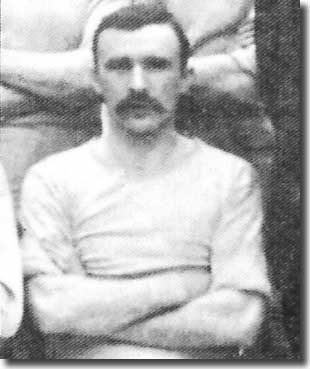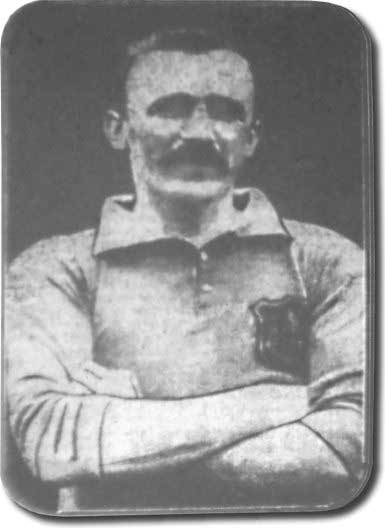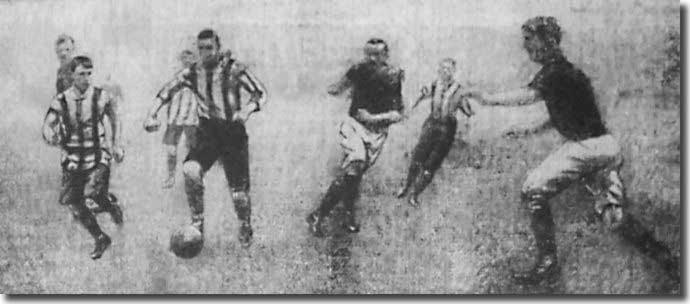 The signing of the highly regarded Scottish centre-half Tom Hynds
in 1907 was a real feather in the cap for Leeds City. The Scot was widely
regarded as a quality pivot, having seen service at the highest level
with a number of major clubs.
The signing of the highly regarded Scottish centre-half Tom Hynds
in 1907 was a real feather in the cap for Leeds City. The Scot was widely
regarded as a quality pivot, having seen service at the highest level
with a number of major clubs.
Born in Hurlford, Ayrshire, on 5 November 1880, Hynds played for Hurlford
Thistle before being signed by Celtic in February 1898. He made his first
competitive start for the Glasgow club in the Charity Cup final against
Rangers on 7 May. Celtic lost 2-0, but Hynds had done enough to be given
a significant amount of action in the season that followed, 1898/99.
However, when Celtic signed former Blackburn centre-half and future
Scotland captain Harry Marshall from Hearts in 1899, it spelled the
end for Hynds with the Hoops. He dropped out of contention and was forced
to switch to right-half when he did play, though he did appear for the
Scottish League against the Irish League in February 1901. He had a
number of spells out on loan, to Bolton in March 1899, Clyde in October
1899 and Manchester City in October 1901.
Hynds made a success of his initial stay at City and the move was made
permanent in September 1902, launching a productive four-year spell with
the club that brought 158 league and 14 Cup appearances. There was speculation
that he was paid even more highly than City's star player Billy Meredith,
such was his value to the club.
Hynds' brother John also had a period with Manchester City, but never
made it beyond the reserves.
With Hynds at the heart of the side, City won the Second Division title
in 1903 and the FA Cup the following season, when a goal from Meredith
was enough to beat Bolton in the Crystal Palace final. City were also
in contention for the league title that year and had to go straight to
Liverpool for their final fixture two days later at Everton. They lost
1-0, leaving Sheffield Wednesday (then just The Wednesday) as champions.
Hynds had a formidable reputation as a centre-half and came close to
Scottish honours while with City, playing for an Anglo Scots representative
side against the Home Scots in a trial match in 1905.
His career in Manchester was brought to an unusual end when City were
engulfed in an illegal payments scandal. There was intense speculation
about City's meteoric rise from obscurity over the previous few seasons
and in the summer of 1904 the FA decided to conduct an investigation
into the way that the club was run. They could only identify a few minor
irregularities and no case was brought against City.
The matter was not over, however. The Spartacus Educational website:
'The following season Manchester City again challenged for the championship.
City needed to beat Aston Villa on the final day of the season. Sandy
Turnbull gave Alec Leake,  the
Villa captain, a torrid time during the game. Leake threw some mud at
him and he responded with a two-fingered gesture. Leake then punched Turnbull.
According to some journalists, at the end of the game, Turnbull was dragged
into the Villa dressing room and beaten up. Villa won the game 3-1 and
Manchester City finished third.
the
Villa captain, a torrid time during the game. Leake threw some mud at
him and he responded with a two-fingered gesture. Leake then punched Turnbull.
According to some journalists, at the end of the game, Turnbull was dragged
into the Villa dressing room and beaten up. Villa won the game 3-1 and
Manchester City finished third.
back to top
'After the game Alec Leake claimed that Billy Meredith had offered him
£10 to throw the game. Meredith was found guilty of this offence by the
Football Association and was fined and suspended from playing football
for a year. Manchester City refused to provide financial help for Meredith
and so he decided to go public about what really was going on at the club:
"What was the secret of the success of the Manchester City team?
In my opinion, the fact that the club put aside the rule that no player
should receive more than four pounds a week ... The team delivered the
goods, the club paid for the goods delivered and both sides were satisfied."
'The Football Association was now forced to carry out another investigation
into the financial activities of Manchester City. Tom Maley was interviewed
and he admitted that he had followed what seemed like standard English
practice by making additional payments to all their players. He claimed
that if all First Division clubs were investigated, not four would come
out "scatheless".
'As a result of their investigation, the Football Association suspended
Tom Maley from football for life. Seventeen players were fined and suspended
until January 1907. As Gary James pointed out in Manchester City: The
Complete Record: "Basically, the entire squad that had finished
as FA Cup-winners in 1904 and narrowly missed out on the championship
two years running were banned. This brought a premature end to City's
first golden age."
'Journalists were aware that virtually every club in the Football League
was making illegal payments to its players. Football writers based in
Manchester argued that the club, being a northern side, were being made
an example of, and thousands of people complained to the Football Association,
but it refused to reduce the bans and fines.'
When Harry Newbould was appointed new City manager in July 1906, he
consequently had only eleven players available to him.
Hynds was implicated in the scandal and in June 1906 was banned from
the game for six months and fined £75. He was transferred to Woolwich
Arsenal in December 1906 while still under suspension. He was only with
the Gunners for five months, playing 13 Lleague and 4 Cup matches as they
reached the Cup semi final.
He signed for Leeds City in May 1907 and was appointed club captain.
He was an immense talent at the heart of the Peacocks team though he
was often criticised for lack of pace.
In their second game of the season,
a 2-2 draw at Leicester Fosse, Wanderer reported in the Mercury:
'Tom Hynds was undoubtedly the pick. The manner in which he engineered
the ball and placed it was exceedingly clever, and it is no exaggeration
to say that he was the mainstay of the team. As a captain, too, he was
exceedingly useful, and kept his men together cleverly.' Days later, Flaneur
wrote in the same paper, 'Hynds, if somewhat slow,  showed
sound judgement. He rarely made a weak pass, and he kept his passes going
throughout the game. His experience of high class football should be invaluable
to the City this season.' A few weeks later, from the same writer: 'Hynds
was his usual cool and steady self at centre-half. He does not seek trouble
by adopting vigorous methods; he is not often in at a charge, but he invariably
does the right thing with the ball, and he inspires confidence in his
colleagues. With a less brainy player than Tom Hynds at centre-half Leeds
City would hardly be able to claim so good a home record.'
showed
sound judgement. He rarely made a weak pass, and he kept his passes going
throughout the game. His experience of high class football should be invaluable
to the City this season.' A few weeks later, from the same writer: 'Hynds
was his usual cool and steady self at centre-half. He does not seek trouble
by adopting vigorous methods; he is not often in at a charge, but he invariably
does the right thing with the ball, and he inspires confidence in his
colleagues. With a less brainy player than Tom Hynds at centre-half Leeds
City would hardly be able to claim so good a home record.'
Hynds missed just one game as City ended the campaign twelfth, and
he earned a host of good reviews. But after the board declined to renew
the contract of secretary-manager Gilbert
Gillies, the centre-half chose to depart Elland Road in May 1908
to join Hearts in Scotland.
Strangely, Hynds only played four games for the Edinburgh club over
the two seasons that followed and in 1910 he joined Ladysmith FC in
British Columbia, Canada.
He returned to Scotland in January 1913 to play for Musselburgh and
then played in America for a while in 1914, though he had to retire
because of sciatica. He later coached overseas, working in Canada and
Italy.
back to top











 The signing of the highly regarded Scottish centre-half Tom Hynds
in 1907 was a real feather in the cap for Leeds City. The Scot was widely
regarded as a quality pivot, having seen service at the highest level
with a number of major clubs.
The signing of the highly regarded Scottish centre-half Tom Hynds
in 1907 was a real feather in the cap for Leeds City. The Scot was widely
regarded as a quality pivot, having seen service at the highest level
with a number of major clubs. the
Villa captain, a torrid time during the game. Leake threw some mud at
him and he responded with a two-fingered gesture. Leake then punched Turnbull.
According to some journalists, at the end of the game, Turnbull was dragged
into the Villa dressing room and beaten up. Villa won the game 3-1 and
Manchester City finished third.
the
Villa captain, a torrid time during the game. Leake threw some mud at
him and he responded with a two-fingered gesture. Leake then punched Turnbull.
According to some journalists, at the end of the game, Turnbull was dragged
into the Villa dressing room and beaten up. Villa won the game 3-1 and
Manchester City finished third. showed
sound judgement. He rarely made a weak pass, and he kept his passes going
throughout the game. His experience of high class football should be invaluable
to the City this season.' A few weeks later, from the same writer: 'Hynds
was his usual cool and steady self at centre-half. He does not seek trouble
by adopting vigorous methods; he is not often in at a charge, but he invariably
does the right thing with the ball, and he inspires confidence in his
colleagues. With a less brainy player than Tom Hynds at centre-half Leeds
City would hardly be able to claim so good a home record.'
showed
sound judgement. He rarely made a weak pass, and he kept his passes going
throughout the game. His experience of high class football should be invaluable
to the City this season.' A few weeks later, from the same writer: 'Hynds
was his usual cool and steady self at centre-half. He does not seek trouble
by adopting vigorous methods; he is not often in at a charge, but he invariably
does the right thing with the ball, and he inspires confidence in his
colleagues. With a less brainy player than Tom Hynds at centre-half Leeds
City would hardly be able to claim so good a home record.'